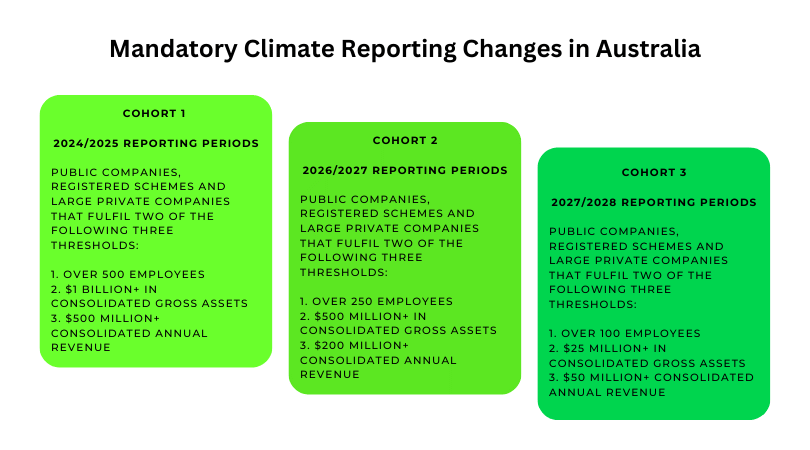There’s an old saying that goes something like ‘if it wasn’t for the last minute, nothing would get done’.
Ask any high school student or university student and they will tell you this adage is true.
So, despite many scientists saying we are now on the precipice, and have potentially already passed 5 major climate change tipping points, it’s somewhat pleasing to see the Australian government finally imposing some mandatory climate reporting on Australian businesses.

The recent announcement by the national market regulator, Chair Joe Longo, about the upcoming climate disclosure rules marks a historical turning point. Described as the “biggest change to corporate reporting in a generation,” this initiative reflects a commendable commitment to transparency and environmental accountability.
“Biggest change to corporate reporting in a generation”
The Groundbreaking New Rules
Beginning July 2024, Australian companies with over 500 employees, or over $1 billion AUD in consolidated assets, or annual consolidated revenues exceeding $500 million (they must have 2 out of these 3 conditions) will embark on a new journey of accountability.
Those companies will now have to include scope 3 emissions in their annual reports – a move that resonates with the global urgency to address climate change. This is a bold step, as outlined in the Australian Institute of Company Directors (AICD) report, aligns with the broader global shift towards sustainable practices.
According to financial data, there are only 77 companies in Australia that have in excess of $500 million in revenue, which really isn’t a lot. However, this revenue number includes the global operations of a business. So any of the larger businesses operating in Australia with over $500 million in global revenue will be captured in this reporting net, and there is quite a large number of companies and well known brands that meet this criteria (think major tech companies, insurance companies, banks etc etc).
In the 2025/2026 financial year, companies with over 250 employees, over $500 million in assets, or $200 million in revenue will be included (2 out of 3 conditions).
In 2026/2027, companies with over 100 employees, over $25 million in assets, or $50 million in revenue will be included (2 out of 3 conditions).

Given there is a tremendous amount of brand benefits, planetary benefits and other reasons why businesses should go green, it makes sense for companies adopt carbon accounting software sooner rather than later.
Demystifying Scope 3 Emissions in Australia
Let’s take a closer look at what scope 3 emissions entail, using Shell as a case study. While scope 1 covers emissions from operations like drill rigs, and scope 2 encompasses refining and shipping, scope 3 dives deeper. It accounts for emissions resulting from customers using the products – like burning Shell fuel in cars. This comprehensive approach is crucial for a holistic understanding of a company’s environmental impact.
Adopting the international IFRS S2 standard, the new Australian regulations will cover 15 categories of scope 3 emissions. These range from emissions linked to the production and transport of goods to those associated with employee travel and the end-of-use disposal of products. This wide net ensures that every aspect of a company’s environmental footprint is accounted for, fostering greater transparency and responsibility.
There are 15 categories of Scope 3 emissions, according to the GHG protocol:
- Purchased goods and services
- Capital goods
- Fuel- and energy-related activities
- Transportation and distribution (upstream)
- Transportation and distribution (downstream)
- Waste generated in operations
- Business travel
- Employee commuting
- Leased assets (upstream)
- Leased assets (downstream)
- Processing of sold products
- Use of sold products
- End-of-life treatment of sold products
- Franchises
- Investments
A Progressive Trend for Businesses
This change isn’t just for the big players in the market. As we head towards the 2030s, these reporting standards will gradually encompass smaller companies, promoting a culture of environmental stewardship across the board. This inclusive approach is a game-changer, ensuring that all sectors contribute to and are accountable for sustainable practices.
Clayton Utz, in their report earlier this year, underscored that this shift towards mandatory reporting marks an unprecedented level of specificity in corporate Australia. This change will not only require companies to invest in new systems, like the best carbon accounting software platforms available, and expertise but could also influence shareholder perspectives. While there may be initial concerns about operational costs and transparency leading to increased scrutiny, this move is likely to foster long-term benefits, including enhanced investor trust and alignment with global sustainability trends.
The Global Context
Australia’s decision is in sync with a global push for environmental transparency. The European Union and the European Central Bank are moving towards similar disclosure requirements for banks, and the US Securities and Exchange Commission is also amplifying its focus on climate disclosures. This global alignment signifies a collective effort to combat climate change and promote sustainable business practices.
Australia’s step towards mandatory climate disclosure is not just a regulatory change; it’s a reflection of a growing global consciousness about environmental responsibility. By requiring companies to report on scope 3 emissions, Australia is fostering a culture of transparency and accountability. This move, though challenging, is a testament to the country’s commitment to a sustainable future. As we witness these changes unfold, it’s inspiring to see Australia playing a pivotal role in the global narrative of environmental stewardship and corporate responsibility.







